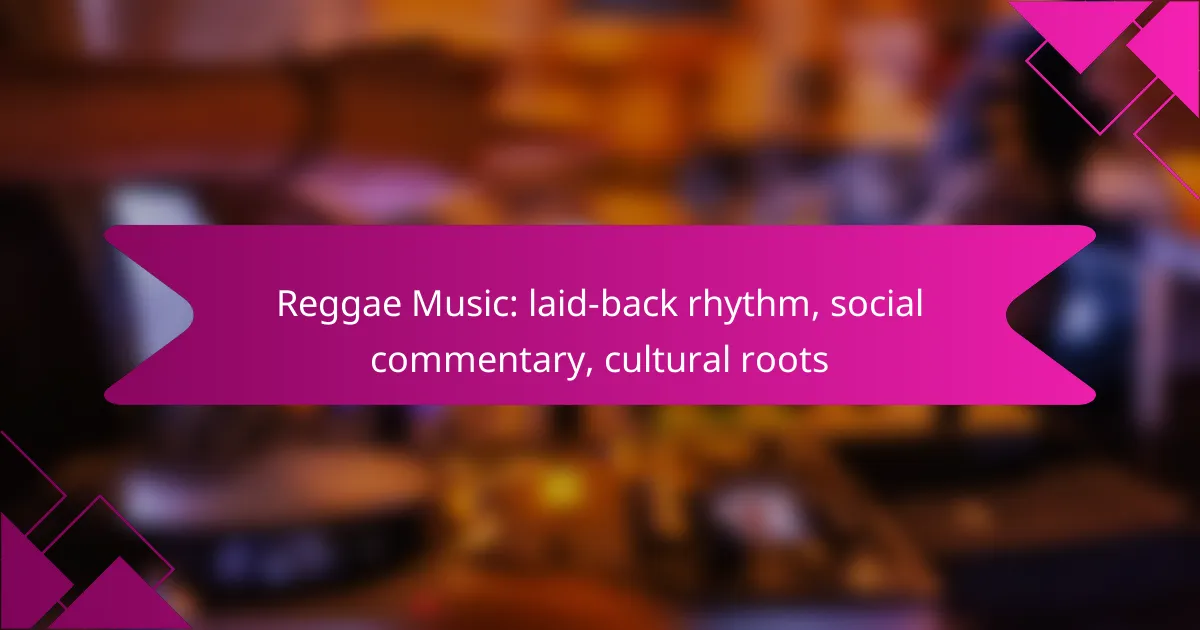Reggae music is renowned for its laid-back rhythm and profound cultural roots, serving as a powerful medium for social commentary. With themes of peace, love, and resistance, it addresses pressing social issues and fosters community engagement. Iconic artists like Bob Marley and Peter Tosh have significantly shaped the genre, using their music to inspire awareness and collective action among listeners.
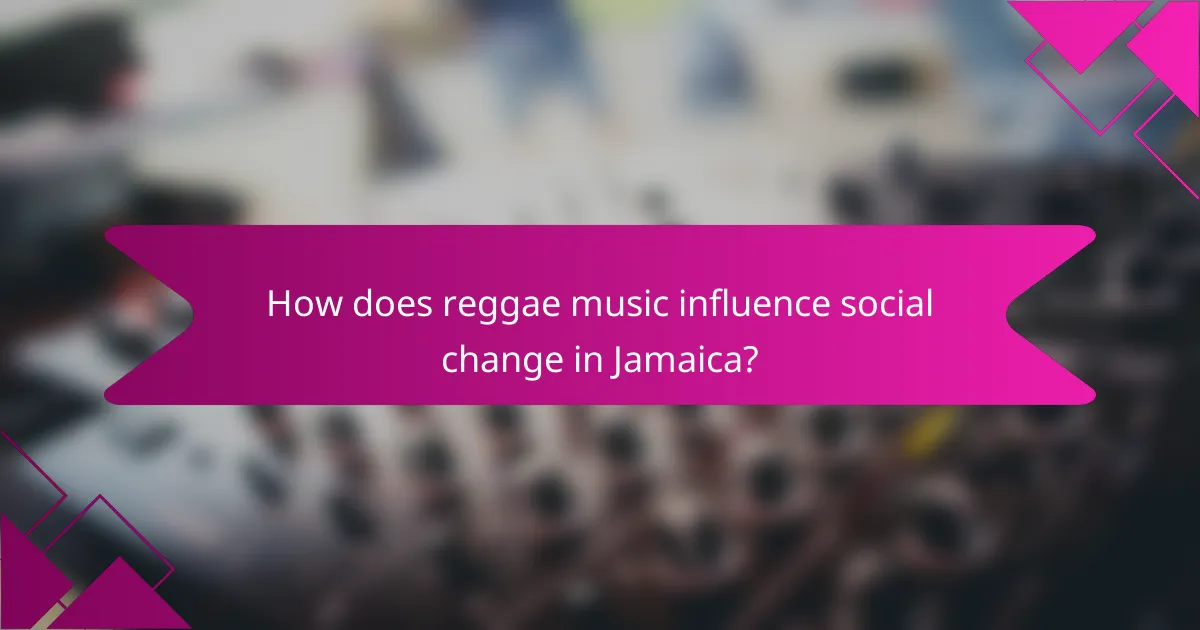
How does reggae music influence social change in Jamaica?
Reggae music plays a significant role in influencing social change in Jamaica by addressing pressing social issues and promoting community engagement. Through its lyrics and rhythms, reggae fosters a sense of awareness and encourages collective action among listeners.
Promotes awareness of social issues
Reggae music often highlights social injustices, poverty, and political struggles faced by the Jamaican people. Artists like Bob Marley and Peter Tosh used their platforms to bring attention to issues such as inequality and human rights, making these topics accessible to a broader audience.
By incorporating themes of resistance and resilience, reggae raises consciousness about societal challenges, prompting listeners to reflect on their circumstances and the need for change. Songs often serve as a call to action, urging individuals to engage with their communities and advocate for justice.
Encourages community activism
Reggae music inspires community activism by fostering a sense of unity and collective purpose. Many reggae songs encourage listeners to participate in local movements, whether through protests, community service, or grassroots organizing.
Events such as reggae festivals and concerts often serve as platforms for social activism, bringing together diverse groups to promote causes like environmental sustainability and social justice. This communal spirit reinforces the idea that collective action can lead to meaningful change.
Supports cultural identity
Reggae music is deeply rooted in Jamaican culture, reflecting the island’s history, struggles, and triumphs. It serves as a powerful expression of national identity, allowing Jamaicans to connect with their heritage and share their stories with the world.
Through its distinct sound and lyrical content, reggae promotes pride in Jamaican culture and encourages the preservation of local traditions. This cultural affirmation not only strengthens community bonds but also empowers individuals to embrace their identity in a global context.
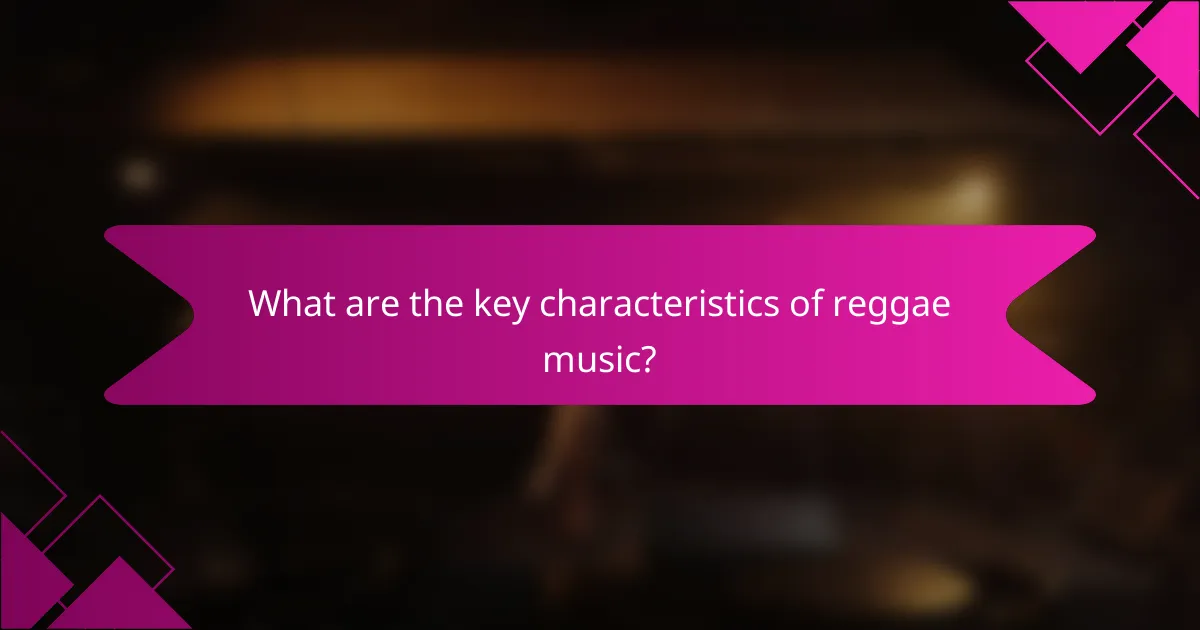
What are the key characteristics of reggae music?
Reggae music is characterized by its distinctive laid-back rhythm, social commentary, and deep cultural roots. It often reflects themes of peace, love, and resistance, making it a powerful medium for expressing social issues.
Laid-back rhythm
The laid-back rhythm of reggae is one of its most defining features, creating a relaxed and easy-going vibe. This rhythm is typically characterized by a slow to moderate tempo, often around 60 to 80 beats per minute, allowing listeners to feel a sense of calm and connection.
In reggae, the emphasis is placed on the offbeat, which contributes to its unique groove. This rhythmic style is often described as “one drop,” where the bass drum hits on the third beat of each measure, providing a foundation for the music’s relaxed feel.
Use of offbeat guitar strumming
Offbeat guitar strumming is a hallmark of reggae music, often referred to as “chopping.” This technique involves strumming the guitar on the offbeats, typically the second and fourth beats of a measure, which creates a syncopated rhythm that complements the laid-back feel.
This strumming style not only enhances the groove but also allows other instruments, such as the bass and drums, to interact dynamically. The result is a rich tapestry of sound that invites listeners to engage with the music on a deeper level.
Incorporation of bass-heavy sound
Reggae music is known for its bass-heavy sound, which plays a crucial role in its overall impact. The bass guitar often carries the melody and rhythm, providing a deep, resonant foundation that drives the music forward.
Typically, the bass lines in reggae are melodic and rhythmic, often featuring syncopation that complements the offbeat guitar strumming. This creates a full-bodied sound that is both engaging and immersive, making reggae a genre that resonates with many listeners around the world.
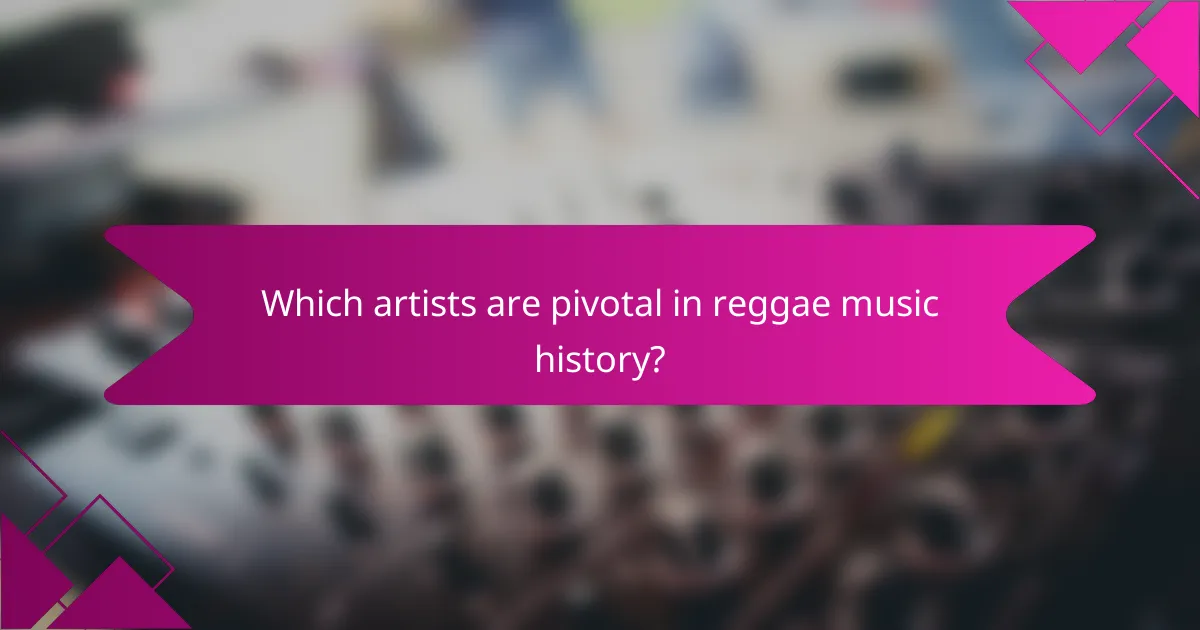
Which artists are pivotal in reggae music history?
Several artists have played crucial roles in shaping reggae music, each contributing unique sounds and messages. Bob Marley, Peter Tosh, and Burning Spear are among the most influential figures, known for their distinctive styles and powerful social commentary.
Bob Marley
Bob Marley is often regarded as the face of reggae music, bringing it to a global audience. His songs, such as “No Woman, No Cry” and “One Love,” blend infectious rhythms with messages of peace, love, and social justice.
Marley’s ability to fuse reggae with rock and pop elements helped him reach diverse listeners. His legacy continues to inspire new generations of musicians and fans alike.
Peter Tosh
Peter Tosh was a founding member of The Wailers alongside Bob Marley and is known for his militant stance on social issues. His songs, including “Legalize It” and “Equal Rights,” advocate for human rights and the legalization of marijuana.
Tosh’s raw and powerful delivery, combined with his commitment to activism, made him a significant figure in reggae history. His work remains influential in discussions around social justice and equality.
Burning Spear
Burning Spear, born Winston Rodney, is celebrated for his deep roots reggae sound and spiritual themes. His music often reflects Rastafarian beliefs and addresses issues like oppression and identity.
Albums such as “Marcus Garvey” and “Social Living” showcase his commitment to cultural heritage and social commentary. Burning Spear’s unique voice and style have solidified his place as a key artist in the reggae genre.
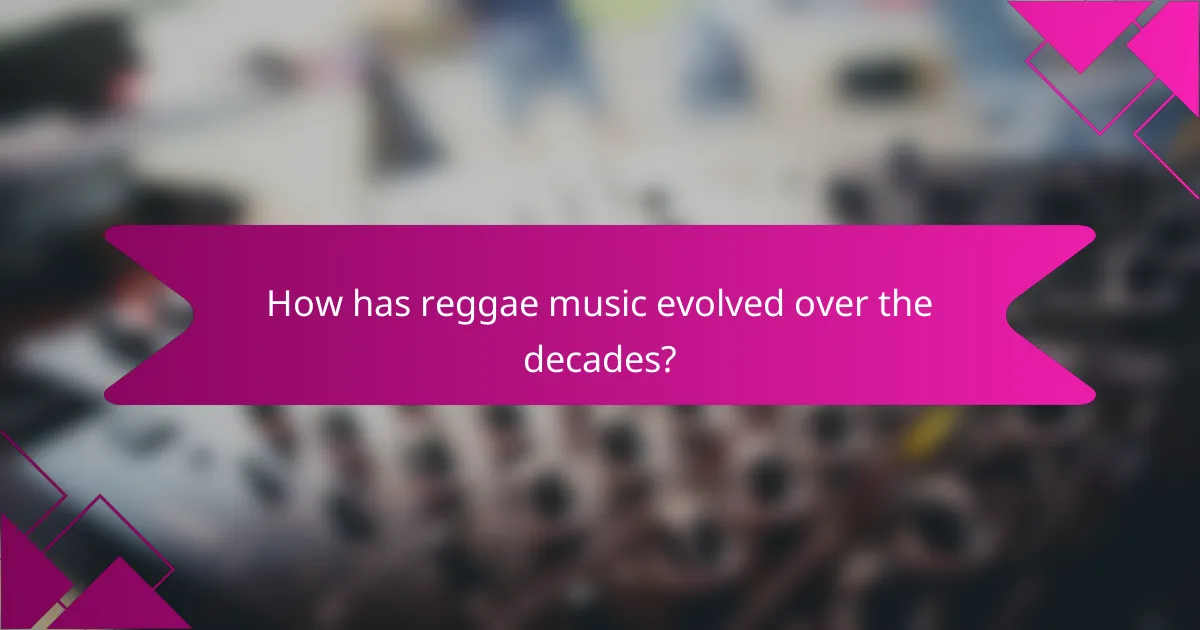
How has reggae music evolved over the decades?
Reggae music has transformed significantly since its inception in the 1960s, incorporating various influences and styles while maintaining its core elements of rhythm and social commentary. Key developments include the integration of hip-hop, the rise of dancehall, and collaborations with artists from diverse genres across the globe.
Integration of hip-hop elements
The integration of hip-hop elements into reggae has created a fusion that resonates with younger audiences. Artists began incorporating rap rhythms, beats, and lyrical styles, enhancing the genre’s appeal and reach. This blend has led to a new wave of reggae-influenced hip-hop tracks, showcasing a seamless exchange between the two styles.
For example, collaborations between reggae artists and hip-hop stars have become common, with tracks often featuring a mix of reggae’s laid-back melodies and hip-hop’s rhythmic intensity. This evolution has broadened reggae’s audience, attracting fans who appreciate both genres.
Emergence of dancehall genre
The emergence of dancehall in the late 1970s marked a significant shift within reggae music. Dancehall introduced faster tempos and more electronic instrumentation, creating a sound that was distinct from traditional reggae. This genre often focuses on party themes, love, and social issues, making it accessible and relatable to a wider audience.
Dancehall has also influenced global music trends, with its beats and styles appearing in pop and electronic music. Artists like Sean Paul and Beenie Man have popularized dancehall internationally, showcasing its vibrant energy and cultural significance.
Global collaborations with various artists
Global collaborations have played a crucial role in reggae’s evolution, allowing the genre to reach new heights and audiences. Reggae artists frequently collaborate with musicians from different backgrounds, blending styles and creating innovative sounds. These partnerships have resulted in unique tracks that highlight reggae’s versatility.
Notable collaborations include those with pop icons and hip-hop artists, which have helped introduce reggae to mainstream audiences. This cross-genre synergy not only enriches the music but also fosters cultural exchange, further solidifying reggae’s place in the global music landscape.
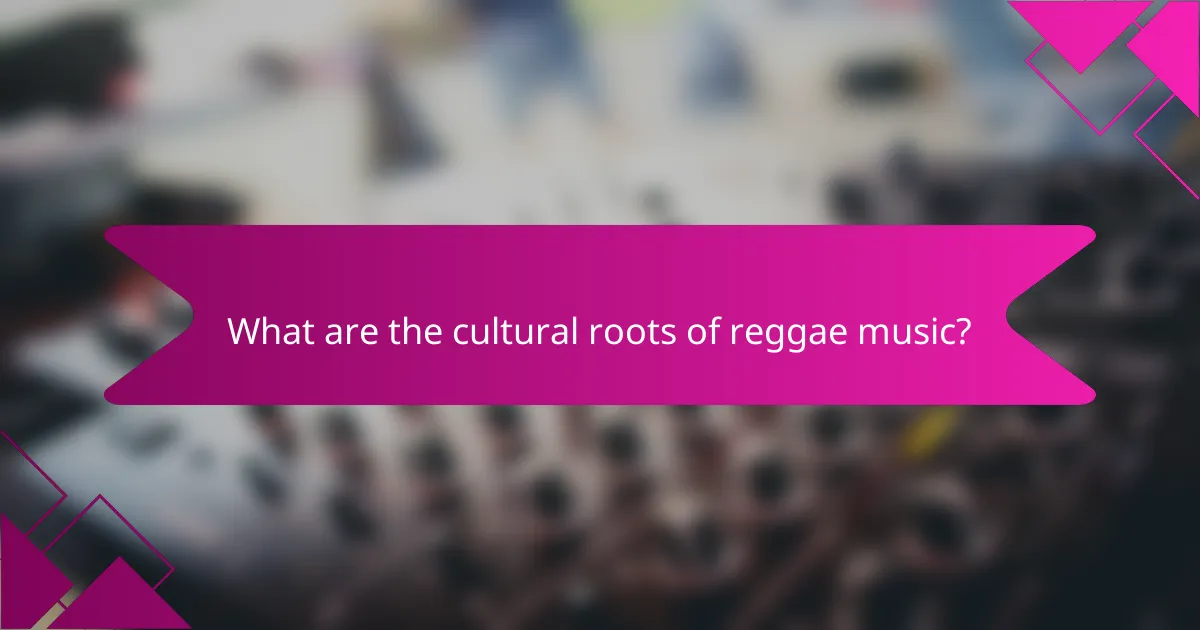
What are the cultural roots of reggae music?
The cultural roots of reggae music are deeply intertwined with Jamaican history, social movements, and spiritual beliefs. Emerging in the late 1960s, reggae reflects the struggles and aspirations of the Jamaican people, drawing from various influences that shape its unique sound and message.
Influence of Rastafarian beliefs
Rastafarian beliefs play a crucial role in the development of reggae music, serving as a spiritual and cultural foundation. The movement emphasizes themes of resistance, social justice, and a connection to African identity, which are often echoed in reggae lyrics. Artists like Bob Marley popularized these themes, using music as a platform to promote Rastafarian ideals and advocate for social change.
Reggae songs frequently incorporate references to Haile Selassie I, the Ethiopian emperor revered by Rastafarians, and the concept of repatriation to Africa. This spiritual connection enriches the genre, making it a vehicle for expressing both personal and collective struggles.
Connection to African heritage
The connection to African heritage is a significant aspect of reggae music, reflecting the historical experiences of enslaved Africans and their descendants in Jamaica. Reggae incorporates traditional African rhythms and musical elements, creating a sound that resonates with the cultural legacy of the African diaspora. This blend of influences fosters a sense of pride and identity among Jamaican artists and listeners alike.
Many reggae songs celebrate African culture and history, often referencing African leaders, traditions, and struggles. This connection reinforces the importance of cultural roots in shaping the genre and its messages of unity and empowerment.
Impact of Jamaican socio-political landscape
The socio-political landscape of Jamaica has significantly influenced reggae music, with artists often addressing issues such as poverty, inequality, and political unrest. The genre emerged during a time of social upheaval, and its lyrics frequently reflect the realities faced by the Jamaican populace. Reggae serves as a form of protest and a call for change, resonating with listeners who share similar experiences.
Key events, such as the rise of political violence in the 1970s and the struggles for independence, have shaped the themes and messages within reggae music. Artists like Peter Tosh and Burning Spear have used their music to comment on these issues, making reggae not just a musical genre but a powerful tool for social commentary and activism.
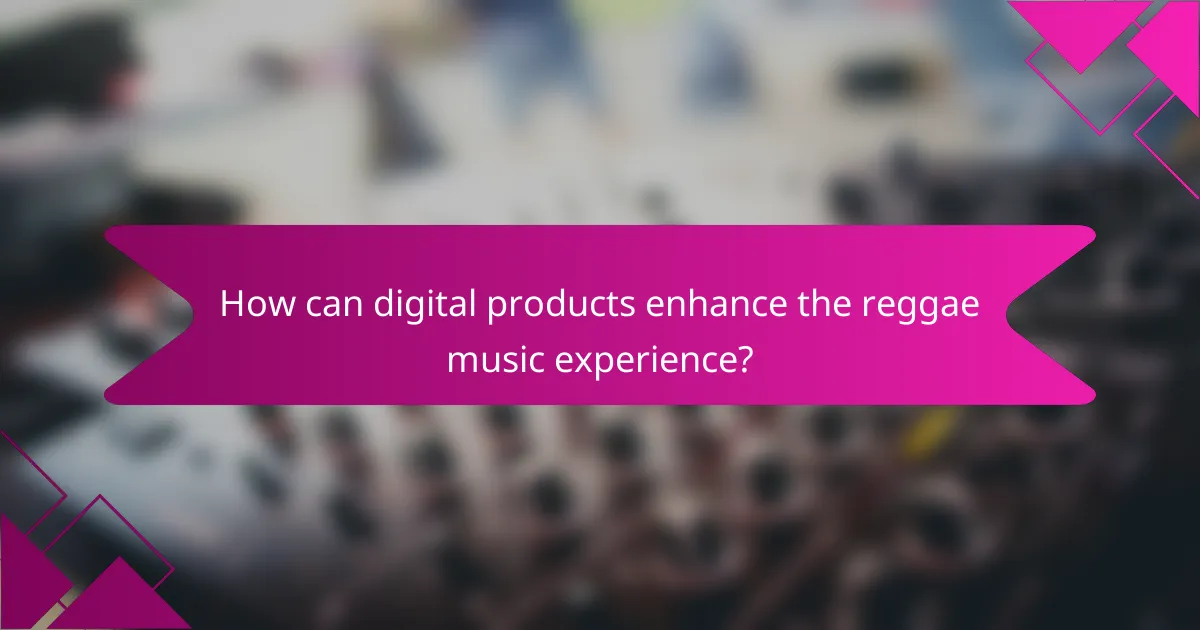
How can digital products enhance the reggae music experience?
Digital products significantly enhance the reggae music experience by providing easy access to music, educational resources, and live performances. These tools allow fans to explore reggae’s rich cultural roots while engaging with the genre in new and interactive ways.
Streaming platforms for music access
Streaming platforms like Spotify, Apple Music, and Tidal offer extensive libraries of reggae music, allowing users to discover classic tracks and new releases effortlessly. Many of these services curate playlists that highlight different reggae styles, such as roots, dancehall, and dub, making it easier for listeners to explore the genre.
Consider subscribing to a service that offers high-quality audio and offline listening options. This way, you can enjoy your favorite reggae tunes without interruptions, whether at home or on the go.
Online courses for learning reggae instruments
Online courses provide an excellent opportunity for aspiring musicians to learn reggae instruments like the guitar, bass, and drums. Platforms such as Udemy and Skillshare offer courses tailored to different skill levels, often taught by experienced reggae musicians.
When selecting a course, look for those that include video demonstrations and practice exercises. This hands-on approach can help you grasp the unique rhythms and techniques that define reggae music.
Virtual concerts and events
Virtual concerts and events have become popular, allowing fans to experience live reggae performances from the comfort of their homes. Many artists host live streams on platforms like YouTube and Facebook, often featuring interactive elements such as Q&A sessions and fan requests.
To make the most of these events, check the artist’s social media for announcements and ticket information. Participating in virtual concerts can deepen your appreciation for reggae while connecting you with a global community of fans.
